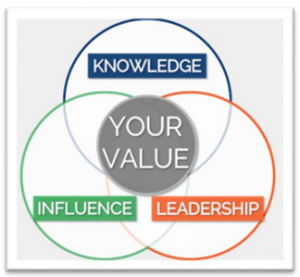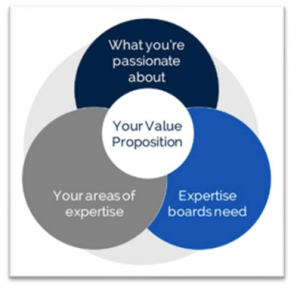In my over 35 years as an executive, corporate director, entrepreneur and CEO of Women Get On Board Inc. (WGOB), there is one question that I am asked more than any other: “How do I build my board resume?”
This is not a straight forward question. Your board resume should be an ongoing dynamic document. It will change as you gain board experience and apply for different board opportunities. That’s why I’ve written this blog today—to help you build your best board resume. In it, I’ll address the most frequently asked questions (FAQ) I get asked about building your board resume, including:
- What is the difference between a career resume and a board resume?
- Do I need governance education to serve on a board?
- What if I don’t have the specific experience a board is looking for?
- What should my board resume include?
- How should I optimize my board resume to show my unique value proposition?
- How can I enhance my board experience and skills?
- How should I showcase myself on LinkedIn?
What is the difference between a career resume and a board resume?
A career resume highlights the roles and accomplishments you have achieved as a professional. In contrast, a board resume showcases your unique value proposition and what skills, expertise, and industry knowledge you bring to a board. In addition, your board resume should demonstrate the governance leadership roles you have served as a board member. For example, what committees have your served on or chaired on your board journey?
Overall, you want to demonstrate your value to a. board. The Savvy Director published a resource called “Guide to your Board Value Proposition”guide that defines the value you bring using this Venn diagram:

Source: The Savvy Director
“Think of your value as a Venn diagram with three concentric circles – your knowledge of the issues, the influence skills you’ve honed over time, and your leadership that lets you know when to lean in and when to step back. Your value is at the intersection of the circles.”
—The Savvy Director
Do I need governance education to serve on a board?
A common question among individuals embarking on a board career is whether or not they need to have a formal governance certification or designation. While it provides a valuable base to prepare you for board roles, it is not always required. Instead, boards first look at your skills, expertise, and governance experience.
If you are interested in getting a governance certification/designation, check out these programs:
- Chartered Director Program (C. Dir)
- Institute of Corporate Directors Designation (ICD.D)
- Global ESG Competent Boards Certificate and Designation Program (GCB.D)
- International Board Director Competency Designation(IBDC.D)
What if I don’t have the specific experience a board is looking for?
Wisdom trumps knowledge and boards know this. Even those who have deep experience and functional expertise don’t have all the answers. Wisdom is a combination of knowledge, judgment and experience — all essential components that go into good decision-making.
Some people feel that they can’t add value if they don’t have a specific governance certification or designation, but that’s not the case. Each board member has different skills, experience, and a new perspective to contribute. Sometimes, the most effective people to contribute to discussion and debate are those with the least subject knowledge. Why? Because they can be objective.
If you don’t have board-specific experience, highlight your multi-dimensional expertise instead. During an interview, will you will be asked about your area of expertise. Board members will learn about your level of skill/expertise and, more importantly, how you reflected on it and applied it. They will look for proof you can handle complex decision making in a collaborative environment. Provide examples of how you worked through a complex problem and generated positive results in a collaborative way—or how you learned from the decision-making process you undertook to make the final decision.
What should my board resume include?
As I have mentioned in my previous blog, “Are You Board-Ready?”, you have to be mindful that it is a very competitive marketplace. There is an over-supply of qualified corporate directors for a limited supply of available corporate board seats. Therefore, your board resume needs to be strong to demonstrate your value.
Your board resume should be no more than two pages. It is a summary of your skills to a board and highlights your:
- Value proposition, i.e. the value add you bring to a board, your unique offering;
- Skills and expertise;
- Industry-specific knowledge;
- Career accomplishments — highlight your executive and other relevant leadership roles to showcase your understanding of the business, the industry and the broader macro environment to gain the respect and confidence of the current board members;
- Speaking engagements and awards — list areas that you are sought after as an expert or have thought-leadership in, and any awards that recognize you for your accomplishments;
- Current and past Board experience — highlight the committees you have served on and the leadership roles you have taken, e.g., Chair of a Committee or Chair of the Board.
Here is my Board Resume and Board Profile that you can use as an example.
How should I optimize my board resume to show my unique value proposition?
Board resume expert Rosa E. Vargas published articles on CareerSteering.com and Forbes about how you can optimize your board resume to demonstrate your value as a board-worthy candidate. Her advice is to highlight:
- Distinction. What is your unique value offer as a Board candidate?
- Board-level experience. List committee and Board experience first.
- ROI Highlights. Include experience that showcases your ability to enhance value to shareholders and describe the improvement in real terms.
- Personal reputation. Share soft/people skills such as relationship building, decision making, and consensus creation.
- Refer to key alliances that impacted your company’s top or bottom line.
- High-level advisement. Create a highlight section with high-stakes and essential collaborations with results from strategic advisement.
- Public image. Promote your industry expertise by listing speaking engagements, community involvement, and mentions in publications.
- Brand championing. Speak to your experience driving company vision, shaping corporate identity, risk management, and protecting/strengthening the company’s brand.
- Business transaction bandwidth. Accentuate leadership through transformations, M&As, restructurings, exits, turnarounds, consolidations, rebranding efforts, etc.
- Quantify ROI, EBITDA growth, stock value, etc.
- Soft skills. Marketing your leadership style, vision and philosophy, along with your leadership character, will help those who recruit for the board of directors explore if you would fit their culture dynamic.
- Illustrate your shareholder value. The role of the board of directors is to protect and grow shareholder value. In alignment with the board’s goal of optimizing shareholder returns, you must pivot your executive resume to accentuate that you have delivered solutions, made savvy decisions, and designed strategies and executions that augmented cash flow, market share, profit, stock value, capital gains, etc.
How should I showcase myself on LinkedIn?
As you update your board resume with the above best practices, don’t forget to update your LinkedIn profile. In today’s digital age, LinkedIn is where you will make your first impression, and your profile must paint the picture of your best board self.
Make sure you include:
- A professional photo of yourself
- A summary of your value proposition and key expertise in the “About” section
- Highlights of your publications in the “Featured” section
- Your experience
- Your educations
- Your certificates and professional designations
How can I enhance my board experience and skills?
Here are four ways you can enhance your board experience and skills:
- Demonstrate leadership. Join a committee that augment your skills and expertise and over team build your leadership presence by taking on a Chair role.
- Pursue your passions. What is it that you are passionate about? How can you use your passion in a meaningful way? Refer to the Savvy Director “Guide to your Board Value Proposition” for more information.

Source: The Savvy Director
- Stay current. Keep up with industry trends by reading articles, attending conferences and follow thought leaders on socials, attend virtual session/conference on latest trends in governance.
- Learn. Consider ongoing professional development. Consider a governance certification program or a short 1-2 day program that focuses on a unique area of expertise, such as ESG or cybersecurity and the role of the board.
Conclusion
Preparing your board resume takes time, creativity, feedback and continuous effort. With these tips, you will be better poised to secure your next board role. Good luck!
For more tips on getting yourself on a board, consider my e-book How to Get Yourself on a Board or consider joining a WGOB program: https://www.womengetonboard.ca/programs/





Leave A Comment